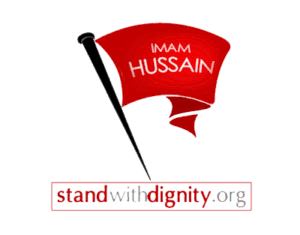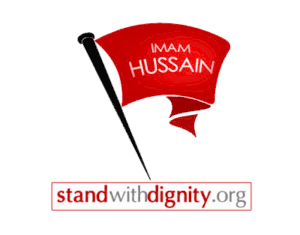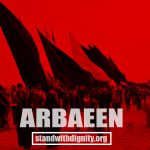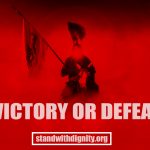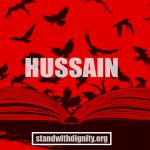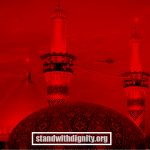Jerrmein Abu Shahba
Now that the season of mourning Abi Abdillah Al Hussain (AS) has reached its temporary conclusion, now what? For the past two months, many of us attended majales e azaa regularly. Many of us observed the state of grief and mourning and sponsored events in the name of Imam Hussain (AS). Many of us participated in Azadari activities and lamented over the tragedy of Karbala. Some of us cried our eyes out while feeling the pain of the atrocities which was inflicted on Imam Hussain (AS) and his family. With these pure feelings of love and de votion to the prophetic household, we are blessed with the reward of forgiveness of our sins and glad tidings of Paradise. But let us now ask ourselves what is the next step? And where do we go from here? The months of Muharram and Safar have passed with its clouds of grief and mourning, but what have we learned from the remembrance of the massacre of Karbala?
Human beings typically display three types of reactions to any event in their lives.
- Emotional Reaction takes place after the heart is touched and the feelings are moved.
- Intellectual Reaction involves the process of thought and contemplation over an event.
- Active Reaction happens after the emotional reaction is coupled with the intellectual and leads to an active response to the event.
For example, if a person gets into an auto accident, he may first experience an emotional reaction of panic, fear, and anxiety. These emotional feelings will then motivate the person to think about what to do to alleviate and deal with this situation in the best and quickest way possible. With some thought process, the person will convert his emotional and intellectual reaction to action and that is, to call for help and dial 911 for emergency aid.
But if the person does not act to help his own situation, and if he merely stops at the stage of emotional reaction, there will not be any meaning to that emotional outpour and he may even hurt himself by his lack of action.
When we speak about the great tragedy of Karbala and the martyrdom of Imam Hussain (AS), this most heinous event in the history of mankind naturally induces an outpour of emotional and psychological reaction by any human who hears of the atrocities which transpired in Karbala. After all, the mere mention of the name ‘Hussain’ is enough to soften the heart and spring a river of tears to the eyes such that one of the names he is known as is “Qateel Al Abaraat”.
But it is not enough for the lover and follower of Imam Hussain (AS) to remain at the stage of emotional expression and it is imperative for us to proceed to the next level where we contemplates over the lessons, morals, and wisdom that we learned during the gatherings and lectures of Muharram. One must ask why did Imam Hussain (AS) sacrifice all that he did while knowing well that he and his companions will be killed in the plains of Karbala and his women and children will be taken as captives to be paraded in the streets of Shaam and Kufa? Does Imam Hussain (AS) want us to simply cry and mourn over his tragedy and not take any other action?
In fact, the believer who yearns to take lesson from Karbala must use his emotional outpour in grief over Imam Husain to RECHARGE himself on a yearly basis and motivate himself to act beyond the days of mourning and more than just the physical expression of grief. The believer must reflect on each and every event which took place in the life of Imam Husain and extract the lessons to benefit himself and his society. After all, as Imam Husain (AS) summarized his goal, “I did not revolt for the cause of evil tyranny or corruption, but to reform my grandfather’s nation. I want to enjoin the good and denounce the evil, and take the course of my father and grandfather”.
The process of recharging the soul and self will lead the believer to the stage of deeds and active response which will include but is certainly not limited to the following:
- Islah (reform) of the Nafs first and foremost, before attempting to reform others. This entails improving one’s manners, behavior, and morals while eliminating the negative habits and weaknesses as that is the Greater Jihad
- Increasing one’s love and devotion to Imam Husain (AS) and the holy household by expression of Mawwadah in every possible way, as Allah (SWT) instructed, “Say: I do not ask of you any reward for it but love for my near relatives; and whoever earns good, We give him more of good therein; surely Allah is Forgiving, Grateful.” [42:23] This Muwaddah must also extend and include the current symbols of piety and righteousness in our world and leaders of truth. In short, we must pay allegiance to the ‘Husain’ of our time.
- Along with the expression of allegiance to the symbols of truth in our current world, we must simultaneously identify the symbols and representatives of falsehood and hypocrisy and to announce our disavowal and condemnation to these idols of apostasy and deviation. In short, we must stand against all ‘Yazids’ of our time.
- To stand up against oppression and injustice wherever it is and whomever it falls on, and to make effort to help those who are weak and oppressed.
- To abide by the pure Muhammadan Islam and to avoid any deviation from the true Sunnah of the Prophet (SA) symbolized by the Quran and household of the Prophet (SA).
- To enjoin the good and forbid the evil after properly identifying the truth from falsehood.
- To recharge ourselves with the fuel of patience, submission, and perseverance on the journey of truth and to withstand any calamity or trial that we may face in our lives while submitting to the divine will and relying on none except the Almighty Allah.
- To pave the way for ourselves to reach the stage of ability and desire to sacrifice ourselves and all that we love and own for the sake of truth and guidance, and in the way of Allah (SWT) and obedience to His commands.
- To preserve the dignity of our women and to properly observe the physical and social Hijab while recognizing that this is what Seyyida Zainab (AS) fought for and our love and mourning to her must be translated into following her example of modesty and chastity.
- To eliminate our selfish behaviors and further develop the trait of selflessness, while taking the example of Hazrat Abbas (AS) who refused to take a sip of the water of Furat while remembering that his beloved father and the children of his camp are suffering from thirst.
- To improve and strengthen the relations of brotherhood among ourselves while taking the example of Hazrat Abbas (AS) who exemplified the peak of brotherly love and submission to his master Hussain (AS).
- By carefully studying and absorbing the pure autobiography of Imam Husain (AS), one can try to emulate his excellence in behavior and conduct and apply in one’s person life on a daily basis. In short, to tread the path of ‘living like Ali and dying like Husain”!
We as the nation of Prophet Muhammad and the devotees of Imam Husain (AS) can benefit much better from the holy months of Muharram and Safar if we actively convert the emotions to energy which leads to actions in the way of Allah (SWT). Just as we fill gas in our cars every once in a while and recharge our phones at the end of each day, we also need to recharge ourselves on a yearly basis at the very least and there is no better way to do so than by the fastest ship of salvation personified in the character of Imam Hussain (AS). It is through his tragedy and through his immaculate personality that we learn the true Islam, and it is through the precious tears shed in these holy months that fills our hearts and souls with the fuel of energy, motivation, and action to actively serve Allah (SWT) while taking Imam Hussain as our role model for perfection and righteousness.
